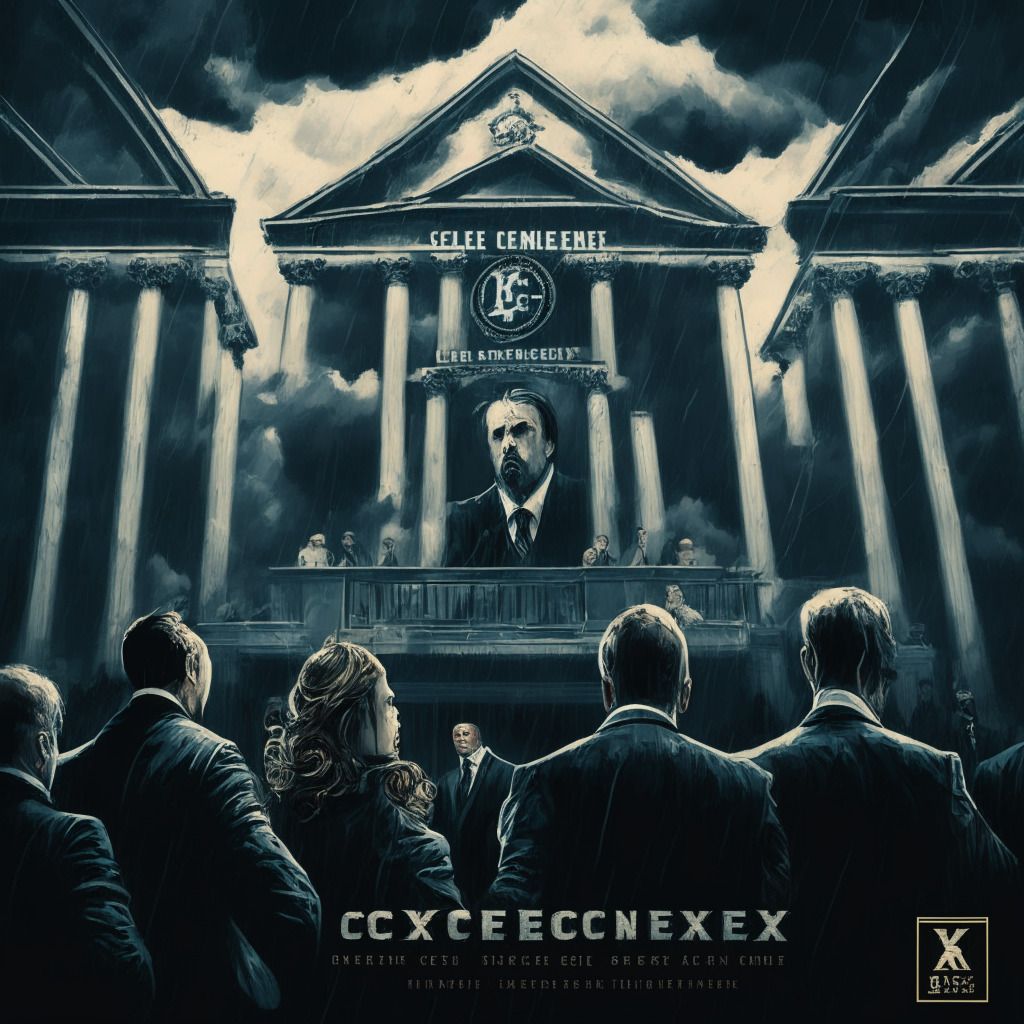“FTX, Three Arrows Capital (3AC), and the SEC contested BlockFi’s bankruptcy plans, arguing manipulation of rules involving billion-dollar disputed transactions. FTX alleges the plan reduces its claims against BlockFi, while 3AC and SEC question procedural fairness and sufficiency of the disclosure statement.”
Search Results for: bankruptcy
The Double-Edged Sword of Crypto: The Financial Paradox Post-Voyager’s Bankruptcy
The bankruptcy of crypto platform Voyager in 2022 reveals the challenges of the crypto world. Regulatory obligations can be financially strenuous, with Voyager’s downfall and legal costs reaching $16.4 million. Despite offering potential for innovation and speculation, the crypto space’s volatility and regulatory complexities present hard-to-ignore challenges for the future.
From Bankruptcy to Redemption: The Controversial Shadow Recovery of Three Arrows Capital
Kyle Davies, co-founder of the collapsed Three Arrows Capital (3AC), has promised creditors “future earnings” via a “shadow recovery process”, stirring skepticism among creditors and crypto community. Davies and his partner launched Open Exchange (OPNX), a platform designed to trade bankruptcy claims, despite the ongoing liquidation proceedings of their previous company. The effectiveness and trustworthiness of this new venture remain questionable.
US Bankruptcy Court Allows Celsius Debtors to Opt for Bitcoin and Ether: A Step Forward or Back?
The U.S. Bankruptcy Court has allowed Celsius Network’s debtors to swap their altcoins for Bitcoin and Ether. This comes after Celsius’ bankruptcy filing following a $10 billion liability revelation. Post-acquisition by a crypto consortium, Fahrenheit, plans are underway for Celsius’ rejuvenation. Regulatory clampdown has encouraged the pivot from altcoins to Bitcoin and Ether.
Unraveling the FTX Debacle: A Disproportionate Price for Crypto Bankruptcy?
“The FTX bankruptcy has raised concerns due to disproportionately high restructuring and recovery costs compared to similar past cases. These expenses already exceed $200 million, impacting large creditors and retail investors. This situation underscores the complexities of the fast-paced digital economy and the need for transparent regulatory paths and enhanced caution in future situations.”
The BlockFi Debacle: Bankruptcy Resolution or Complete Liquidation – Which Path Leads to Better Recovery?
“Creditor committee alleges defunct crypto lender BlockFi’s management of fraud and delay tactics amid bankruptcy proceedings. BlockFi’s recent filing suggests a potential 39%-100% recovery for account holders. Still, the question arises whether liquidating the company is the best course for the creditors.”
FTX Bankruptcy: Media Outlets Vs. Privacy – Clashing in the Quest for Transparency
Four prominent media outlets appeal against a bankruptcy judge’s decision to permanently redact FTX crypto exchange customers’ names, citing the need for transparency. FTX argues that revealing names could expose clients to identity theft and scams, affecting the success of bankruptcy reorganization.
Debate Over FTX Customer Privacy: Balancing Crypto Risks and Bankruptcy Disclosures
This article discusses the debate surrounding FTX’s decision to protect customer names from bankruptcy disclosure requirements due to their use of cryptocurrency. The outcome may set significant precedents for future bankruptcy cases involving cryptocurrencies, focusing on balancing customer privacy and legal obligations.
From Bankruptcy to Galaxy Digital: Examining Leon Marshall’s Crypto Journey and Industry Resilience
Crypto veteran Leon Marshall joins Galaxy Digital as global head of sales, bringing valuable experience from Gnosis, CryptoCompare, UBS, and JPMorgan Chase. Despite recent challenges, Marshall remains optimistic about the digital asset industry’s future and Galaxy’s role within.
Bankruptcy and Revival: Core Scientific’s Path to Restructuring and Crypto Industry Impact
Bitcoin miner Core Scientific has filed its bankruptcy plan, focusing on revamping its business model after experiencing a boost in liquidity. The company attributes its improved performance to higher bitcoin prices, increased network hash rate, and reduced energy costs. The Chapter 11 bankruptcy plan serves as a vital tool in restructuring the company’s operations.
FTX Bankruptcy Legal Fees Skyrocket: Unregulated Crypto Exchanges Under Scrutiny
FTX’s bankruptcy announcement has raised concerns over legal fees surpassing $200 million. The cryptocurrency exchange’s unregulated status and lack of corporate governance contribute to these expenses. Independent auditor Katherine Stadler advises cost-conscious approaches for better results and highlights the need for robust governance structures in the crypto world.
Bankruptcy and Rebirth: FTX 2.0 Aims to Restore Value Amid Escalating Legal Costs
FTX’s bankruptcy filings reveal escalating legal and advisory costs totaling $121.8 million, prompting former clients to consider relaunching the exchange under new leadership. Spearheaded by crypto influencer Loomdart, the FTX 2.0 coalition aims to restore value to customers and expedite creditor repayment.
Celsius Bankruptcy Plan: Converting Altcoins and Legal Concerns for Borrowers
Crypto lender Celsius proposes a reorganization plan to convert customer altcoins into Bitcoin and Ether, addressing regulatory concerns and maximizing asset value. However, borrowers may object to repayment demands without collateral return, potentially impacting industry regulations and customer trust.
Crypto Controversy: Kyle Davies, 3AC Bankruptcy and the Need for Crypto Regulation Balance
Kyle Davies, founder of Three Arrows Capital, faces contempt of court charges for failing to respond to a subpoena concerning the collapse of the hedge fund. This case raises questions about the need for tighter regulations in the unregulated crypto industry to protect investors and maintain market stability.
Banq Bankruptcy and BitGo Acquisition: Navigating a Shaky Crypto Custody Partnership
Banq, a subsidiary of Prime Trust, filed for bankruptcy protection following unauthorized transfer of $17.5 million in assets and trade secret leakage. This raises questions about the company’s acquisition deal with digital asset custodian BitGo and the future of the crypto custody market.
Banq Bankruptcy Saga: Domino Effects, Legal Battles, and Crypto Industry Lessons
Banq’s bankruptcy filing amidst Prime Trust’s acquisition deal with BitGo has raised concerns over accountability and transparency in the crypto space. With TrueUSD and Haru Invest also affected, the industry must address safety and integrity challenges in the midst of a demanding regulatory climate.
Genesis Bankruptcy Battle: Crypto Lenders, Exchanges, and Creditors Fight for Share
Cryptocurrency lender Genesis faces continued bankruptcy threats as mediated talks with creditors, including parent company DCG, progress. The updated reorganization plan indicates some agreements on key issues, but disputes and negotiations among stakeholders persist, involving companies like DCG, Three Arrows Capital, FTX, and Alameda Research.
FTX Bankruptcy and Customer Privacy: Protecting Assets or Hindering Trust in Crypto Markets?
The ongoing disagreement surrounding the collapsed crypto exchange FTX and the disclosure of customer names persists, with concerns that revealing names could “degrade value” and impair the sales process, affecting repayment to creditors. Highlighting the delicate balance between privacy and public transparency, this case could have ramifications on cryptocurrency regulations and future exchange operations.
SEC Lawsuits, FTX Bankruptcy, and BitGo Acquisition: Market Impact on Bitcoin and Ethereum
Bitcoin and Ethereum face significant developments impacting price predictions due to the US SEC lawsuit, bankruptcy of FTX exchange, and BitGo’s acquisition deal. As clear regulation and reliable custody services are crucial, cryptocurrency prices remain sensitive to market changes.
Genesis Bankruptcy Saga: Mediation Extension Frustrates Creditors & Gemini Users
The mediation period between crypto lender Genesis and its creditors, including Gemini, takes a new turn as U.S. Bankruptcy Court Judge Sean Lane extends it until June 16 amid growing concerns over parent company Digital Currency Group’s (DCG) role. This comes after the multi-billion dollar collapse of Genesis’ borrower – crypto exchange FTX – and tensions rise as the case resolution remains far from being concluded.
Gate.io vs Bankruptcy Rumors: Unraveling Multichain’s Impact on Crypto Exchanges
Rumors of bankruptcy surrounding major crypto exchange Gate.io, connected to the troubled cross-chain protocol Multichain, have alarmed investors. Gate.io threatens legal action against rumor spreaders, while recent events suggest a possible recovery for Multichain, with some cross-chain bridges back online.
3AC Involvement in Genesis Global Bankruptcy Mediation: Balancing Stakeholders’ Interests
Three Arrows Capital (3AC) requests to join the bankruptcy mediation process for crypto lender Genesis Global, amid concerns that Genesis’s plan negotiation efforts may not address the claims of all stakeholders, including 3AC’s $1 billion. The involvement of 3AC, one of the largest creditors, could lead to a more balanced outcome and enhance the possibility of reaching a consensus. However, some argue their involvement may complicate the mediation process. The debate surrounding 3AC’s participation remains heated as stakeholders seek a balance ensuring their best interests.
Bankruptcy Battle: FTX vs Genesis and the Importance of Fair Legal Procedures in Crypto
FTX is contesting Genesis’ claim that its debtors are entitled to nothing in a recent court filing, amid ongoing bankruptcy proceedings. This highlights the importance of transparency, proper communication, and including all stakeholders in mediation to ensure fairness and resolve issues in the crypto industry.
Genesis Bankruptcy Battle: FTX’s $3.9B Claim vs. Expedited Settlement – The High-Stakes Faceoff
FTX objects to extending court-mediated settlement talks for bankrupt crypto lender Genesis and opposes estimating their debtors’ claims at $0.00. As Genesis’ largest creditor with $3.9 billion claims, FTX’s objection adds to mounting pressure from individual creditors seeking faster resolution. Meanwhile, Genesis faces lawsuits and SEC actions over its customer lending program, Earn.
Independent Examiner Debate in FTX Bankruptcy: Legal Dispute, Costs & Implications
A U.S. District Judge referred a motion concerning the appointment of an independent examiner for FTX’s bankruptcy to an appellate court. The case raises questions about the need for an independent examiner in crypto exchange bankruptcies, potential costs, and implications for future similar cases.
FTX Bankruptcy Case Heads to Higher Court: Financial Burden vs Need for Transparency
A Delaware District Judge has referred the FTX bankruptcy case to the US Third Circuit Court of Appeals. Despite concerns about potential financial burdens, an independent investigator may be appointed to maintain transparency and fairness, and reveal any malfeasance that led to the collapse.
Shaquille O’Neal Served Legal Papers Over FTX Bankruptcy & NFT Project: Celebrity Responsibility Debate
NBA legend Shaquille O’Neal faces legal challenges over the FTX bankruptcy and his Solana-based NFT project, Astrals, accused of being unregistered securities. The lawsuit raises questions about celebrity responsibility in the crypto and NFT realms, highlighting potential for abuse and manipulation.
Bankruptcy Woes: Core Scientific Struggles Amid Crypto Regulation Uncertainty
Core Scientific, once the largest crypto mining company, is struggling under bankruptcy and creditor pressure amidst evolving cryptocurrency regulations. As the business landscape changes, adaptability is crucial for the ever-maturing crypto industry.
BlockFi Bankruptcy Battle: Examining the Controversy and Balancing Innovation with Regulations
BlockFi’s bankruptcy battle faces tensions with creditors citing poor management and restructuring plans. A withdrawn wind-down plan suggested recovering funds through claims against commercial counterparts, but a corrective letter clarifies that soliciting acceptances remains unlawful. An upcoming hearing on June 20 will determine BlockFi’s legacy.
FTX Bankruptcy Battle: Retrieving $240M from Embed Acquisition & Lessons for Crypto Industry
The controversial bankruptcy of crypto exchange FTX prompts efforts to retrieve over $240 million paid for stock trading platform Embed, amidst claims of inadequate investigation by former executives. The ongoing turmoil raises concerns about due diligence and highlights the importance of regaining lost finances and rebuilding the company’s reputation in the blockchain industry.
FTX Bankruptcy Case: Balancing Transparency, Costs, and Legal Requirements
The U.S. Trustee challenges a Delaware bankruptcy court’s decision, arguing that an independent examiner must be appointed in the FTX bankruptcy case. Ensuring transparency, this appointment may bring unbiased perspective despite an estimated $100 million examination cost.
Voyager Digital’s Bankruptcy Saga: A Cautionary Tale for Crypto Companies
Crypto lender Voyager Digital’s liquidation plan received approval, enabling the return of approximately $1.33 billion in crypto assets to its customers. The firm’s bankruptcy highlights the importance of understanding the complex economic and regulatory landscape in the turbulent and unpredictable cryptocurrency market.































